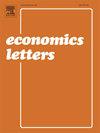AI and employment in Europe
IF 2.1
4区 经济学
Q2 ECONOMICS
引用次数: 0
Abstract
This paper contributes to the growing research on AI's labour market impact by presenting novel evidence on the heterogeneous employment effects of AI across EU countries from 2012 to 2022. While concerns persist about AI's disruptive potential, our findings show that occupations more exposed to AI technologies experience stronger employment growth, all else being equal. However, these effects are not uniform across the EU. Positive employment outcomes are concentrated in Innovation Leaders (Belgium, Denmark, Finland, the Netherlands and Sweden) and Strong Innovators (Austria, Cyprus, France, Germany, Ireland and Luxembourg), emphasising the context-dependent nature of AI's impact. These findings reflect the uneven distribution of innovation capabilities, with a country's innovation system and ‘absorptive capacity’ playing a crucial role in fully harnessing AI's potential for employment (and economic) growth. Ultimately, this research challenges the notion of AI as universally beneficial or harmful, highlighting its asymmetric effects across countries and occupations.
求助全文
约1分钟内获得全文
求助全文
来源期刊

Economics Letters
ECONOMICS-
CiteScore
3.20
自引率
5.00%
发文量
348
审稿时长
30 days
期刊介绍:
Many economists today are concerned by the proliferation of journals and the concomitant labyrinth of research to be conquered in order to reach the specific information they require. To combat this tendency, Economics Letters has been conceived and designed outside the realm of the traditional economics journal. As a Letters Journal, it consists of concise communications (letters) that provide a means of rapid and efficient dissemination of new results, models and methods in all fields of economic research.
 求助内容:
求助内容: 应助结果提醒方式:
应助结果提醒方式:


